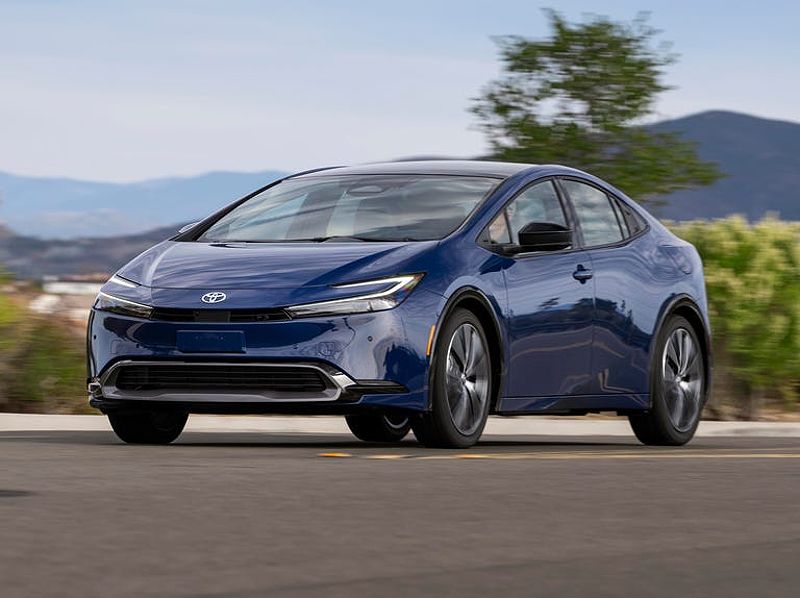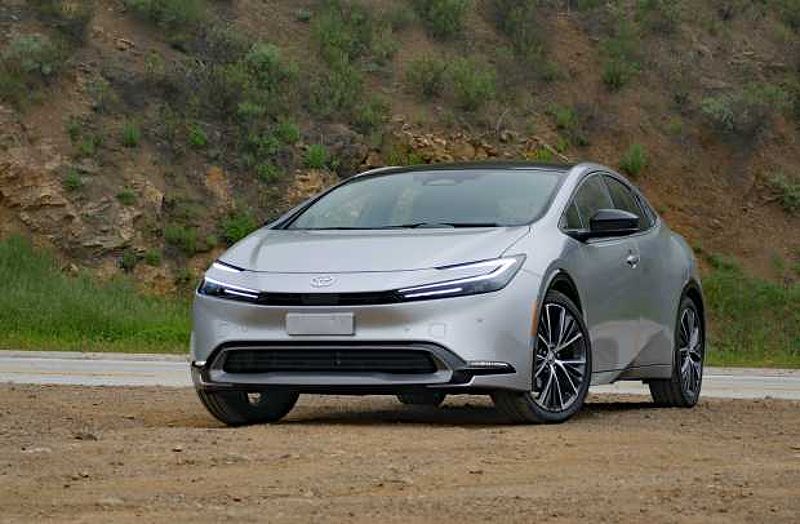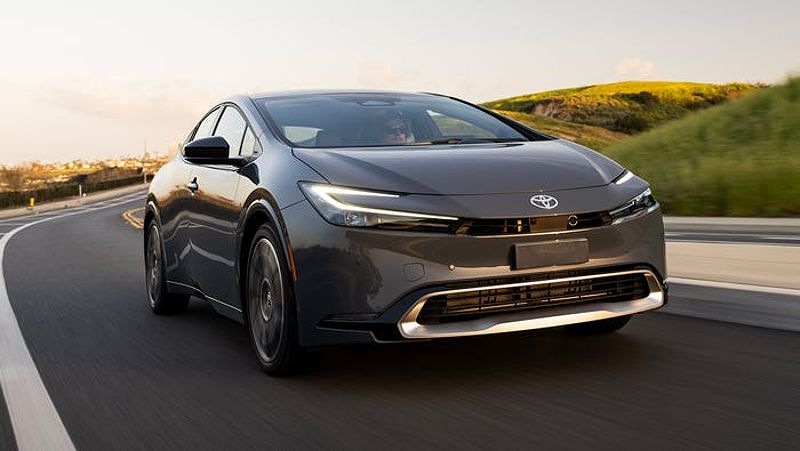The Toyota Prius has long been synonymous with fuel-efficient driving, but the latest models have significantly improved in performance and technology. Gone are the days of sluggish acceleration; the 2024 Prius offers surprisingly brisk handling, making it a more engaging driving experience. However, the lower roofline still compromises rear headroom for taller passengers. This review examines whether the trade-offs are worth it.
Prius Performance and Fuel Efficiency: How Does it Drive?
When considering if the Toyota Prius is a good car, the driving experience is a crucial factor. The 2024 Prius has stepped up its game with a 194-horsepower hybrid powertrain that delivers a peppy ride. For those who crave a little more power, the Prius Prime plug-in hybrid variant offers an impressive 220 horsepower. The standard Prius can zip from 0 to 60 mph in just 7.1 seconds, a significant improvement over previous generations.
Acceleration and Handling
The Prius is not just about numbers; it’s about how it feels on the road. The handling is nimble, making it a suitable companion for both city streets and highway cruising. In urban environments, its compact size and responsive steering make navigating tight spaces a breeze. On the highway, the Prius remains stable, providing a comfortable ride even at higher speeds.
Real-World Fuel Economy
One of the main reasons people ask, “Is the Prius a good car?” is its legendary fuel efficiency. The standard model boasts an EPA-estimated 57 mpg in the city and 56 mpg on the highway, while the all-wheel-drive LE variant delivers a combined 54 mpg. The Prius Prime, with its electric-only range of up to 44 miles, can achieve impressive hybrid mode figures of 48 to 52 mpg. When compared to competitors like the Honda Civic Hybrid and Hyundai Ioniq, the Prius consistently stands out for its fuel-saving capabilities.
Comparison to Competitors
In the hybrid segment, the Prius faces stiff competition. The Honda Civic Hybrid, for example, has a 151-horsepower engine and takes 8.2 seconds to reach 60 mph. The Hyundai Ioniq, with its 139-horsepower engine, lags behind in both performance and fuel efficiency. While the Kia Niro is a solid option, it doesn’t quite match the Prius’s blend of power and efficiency. The real question remains: is the Toyota Prius a good car? The answer leans heavily toward yes, especially for those who prioritize efficiency and performance.

Prius Features, Technology, and Interior: What’s Inside?
The interior of the Prius has undergone a significant transformation, making it more appealing to a broader audience. The cabin is designed with comfort and technology in mind, and it offers a variety of features that enhance the driving experience.
Standard and Optional Features
The base LE model starts at $28,745 and comes loaded with features like 17-inch wheels, blind-spot monitoring, and an 8-inch infotainment touchscreen that supports wireless Apple CarPlay and Android Auto. If you step up to the XLE for $32,190, you’ll get heated front seats and a larger 12.3-inch infotainment display with cloud-based navigation and voice recognition. The top-tier Limited trim, priced at $35,760, adds a premium JBL audio system, ventilated front seats, and a head-up display.
Infotainment System
The Prius’s infotainment system is intuitive and user-friendly, with the larger display providing enhanced connectivity and over-the-air software updates to keep the system current without the need for dealership visits.
Interior Space and Comfort
The Prius can comfortably seat up to five passengers, with a cargo area of 20 cubic feet. While this is generous compared to some competitors, taller passengers might find the lower roofline a bit constraining. Overall, the materials used in the cabin exude quality, and the design is modern and sleek.
Comparison to Competitors
Compared to rivals, the Prius offers more cargo space than the Honda Civic Hybrid and Hyundai Ioniq. While the Kia Niro provides a similar capacity, it doesn’t match the Prius’s tech-savvy features. If you’re looking for a hybrid that combines practicality and advanced technology, the Prius is hard to beat.

Prius Pricing, Trims, and Safety: Cost and Safety Ratings
Now, let’s dive into the pricing and safety features of the Prius. With several trim levels available, there’s a Prius for nearly every budget and preference.
Pricing Overview
The pricing starts at $28,745 for the LE model, which is competitive for a hybrid. The XLE and Limited trims range from $32,190 to $35,760, respectively. For those interested in the Prius Prime, the SE starts at $33,770, while the top-tier XSE Premium reaches $40,465. While the Prius may have a slightly higher starting price compared to some competitors, the long-term savings on fuel can make it a worthwhile investment.
Safety Features and Ratings
Safety is a top priority for many buyers, and the Prius does not disappoint. Equipped with Toyota Safety Sense 3.0, the Prius includes advanced driver-assistance technologies like pre-collision system with pedestrian detection, lane departure alert with steering assist, automatic high beams, and adaptive cruise control. Both the IIHS and NHTSA have awarded the Prius top safety ratings, providing peace of mind for families and commuters alike.
Value Proposition
When weighing the value of the Prius against competitors, it’s clear that its combination of safety features, reliability, and fuel efficiency makes it a strong contender. The Honda Civic Hybrid and Hyundai Ioniq have similar safety features, but the Prius’s advanced technology often edges them out.

Is the Toyota Prius Right for You? Considering Your Needs
So, is the Toyota Prius a good car for your lifestyle? The answer depends on your specific needs and preferences.
Suitability for Different Lifestyles
The Prius is ideal for city drivers, long-distance commuters, and families. Its fuel efficiency makes it an excellent choice for those who frequently find themselves in stop-and-go traffic. For families, the spacious interior and safety features provide comfort and security during school runs and weekend getaways.
Potential Drawbacks
However, it’s essential to consider some potential drawbacks. The lower roofline can limit rear visibility and headroom for taller passengers. Additionally, while the cargo space is decent, it may not be sufficient for those who regularly transport larger items, as SUVs or crossovers might offer.
Alternatives to Consider
If you’re considering a hybrid vehicle, you might also look at SUVs or hatchbacks that offer more cargo space. Vehicles like the Kia Niro or even the Honda CR-V Hybrid could provide more versatility, depending on your needs.
Choosing the Right Trim Level
When deciding on the right trim level, think about your budget and the features that matter most to you. If technology and comfort are your priorities, the Limited trim with its premium features might be worth the investment. However, if you’re looking for a more budget-friendly option, the LE model still offers plenty of value.
Frequently Asked Questions (FAQ)
Q: What is the warranty on a Toyota Prius?
A: The Prius typically comes with a 3-year/36,000-mile basic warranty, a 5-year/60,000-mile powertrain warranty, and a longer warranty on the hybrid system components.
Q: How much does it cost to maintain a Toyota Prius?
A: Maintenance costs are generally lower than for comparable gasoline vehicles due to fewer moving parts in the hybrid system. Regular maintenance schedules should be followed.
Q: How long does it take to charge a Prius Prime?
A: Charging time varies depending on the charging station. A standard 120V outlet takes significantly longer than a 240V Level 2 charger.
Q: What are the main differences between the Prius and Prius Prime?
A: The Prius Prime is a plug-in hybrid with a larger battery, offering a longer all-electric range compared to the standard Prius hybrid.
Q: How does the Prius compare to other hybrid vehicles in its class?
A: The Prius often leads in fuel efficiency and offers a strong combination of performance and technology features compared to competitors like the Honda Insight and Hyundai Ioniq.
Conclusion
The Toyota Prius offers a compelling blend of fuel efficiency, technology, and practicality. While its higher starting price compared to some competitors might be a factor, its superior fuel economy, advanced safety features, and available all-wheel-drive option make it a strong contender for many buyers. Whether it’s the right car for you depends on your individual needs and budget. Consider your driving style, commuting distance, and desired features to make an informed decision. Test drive a Prius and compare it to its competitors before making your final choice. Visit your local Toyota dealer to learn more and schedule a test drive today.
